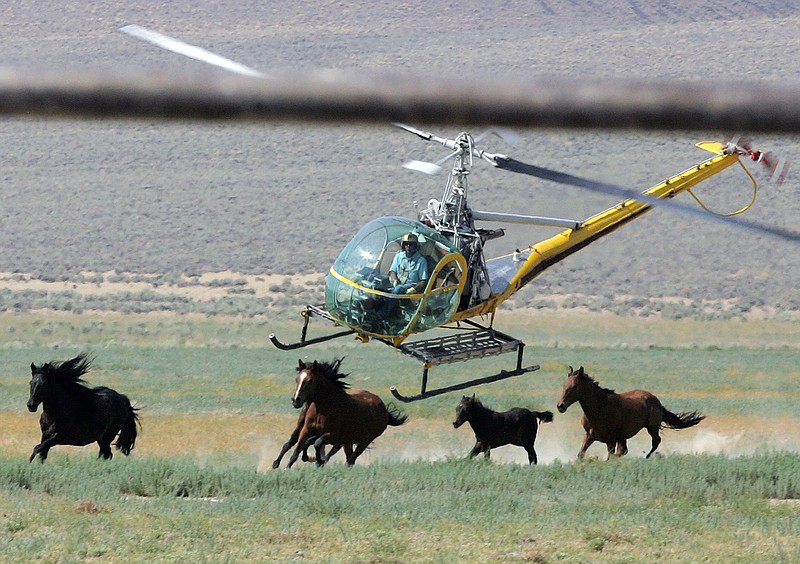RENO, Nev. -- Over the objections of wild horse advocates, a judge cleared the way Wednesday night for the U.S. government to continue capturing thousands of mustangs in Nevada despite the deaths of 31 horses during the weeks-long roundup.
In a ruling from the bench after a seven-hour hearing in Reno, U.S. District Judge Larry Hicks said he was denying Wild Horse Education's bid for an emergency order to halt the roundup the nonprofit advocacy group argues is inhumane and illegal.
"The fact is, I don't have evidence that would support the granting of a preliminary injunction or temporary restraining order," Hicks said.
The judge said the deaths of the horses were tragic. But he said that the U.S. Bureau of Land Management appears to be complying with the law and doing everything it can to gather the mustangs as humanely as possible from the range to cull the size of overpopulated herds.
"These tragedies are going to occur when you have gathers, so I cannot find there are inhumane treatments with these incidents," Hicks said.
"The stallions, mares, foals -- they are beautiful animals but at they same time they are wild animals. There are going (to) be some that are lost," he said.
Government lawyers representing the Bureau of Land Management said the deaths among 2,500 horses gathered since July 9 were unfortunate but expected. They said the free-roaming animals pose a threat to the ecological health of public rangeland.
Horse advocates argued the deaths were unnecessary, resulting from inhumane tactics being used to expedite removals from public lands where pregnant mares and young foals were being chased in summer heat across rocky high-desert terrain into makeshift corrals.
The roundup halfway between Reno and Salt Lake City is scheduled to continue through Aug. 22.
Government lawyers said in earlier court filings the horse advocates are trying to inflame emotions with photos and videos of injured mustangs trying to flee helicopters and wranglers on horseback. One with a broken leg was chased for 35 minutes before it was euthanized.
"Deaths are tragic, but they are a known and anticipated part of wild horse gathers that must be weighed against the harm the same horses face under drought and overpopulation conditions if the gather cannot be completed," Justice Department lawyers representing the bureau wrote.
The agency says the 31 deaths are within the average mortality rate of 1% and 1.2% for wild horse gathers conducted from 2010-19.
"Plaintiffs list the number of deaths that have occurred during the gathers but fail to mention the thousands of horses that have been gathered safely," government lawyers wrote.
"Despite plaintiffs' sensational allegations, there is nothing out of the ordinary ... and nothing to suggest the conditions of these gathers have been unusually dangerous to the horses," they added.
Horse advocates said the mustangs have been made scapegoats for damage most often caused by taxpayer-subsidized cattle grazing the same limited forage on the high-desert range at much higher numbers.
They said in a lawsuit filed July 26 that the roundup is illegally based on an outdated environmental review that fails to reflect current conditions on the range, and that it also ignores evidence the herds are still in the midst of foaling season, when the use of helicopters is largely prohibited.
Democratic U.S. Rep. Dina Titus, of Nevada, is pushing legislation in Congress to outlaw the use of helicopters altogether.
The lawsuit also claims the agency is failing to comply with requirements that the public be allowed to witness the roundups, frequently parking trucks and trailers to obscure distant views from the designated observation area.
Above all, the lawsuit argues, the roundup violates a 1971 U.S. law that mandates that the animals be treated humanely.
